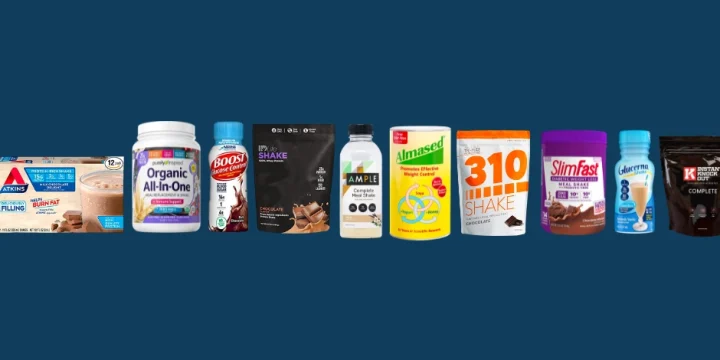Most of my female clients who become pregnant continue with modified fitness plans during their pregnancy and when their baby is born.
One question I often get asked by pregnant women is whether it's safe to continue with their protein powders.
Obviously, during pregnancy and breastfeeding, women have very different nutritional needs, and safety is a very real concern.
So, our team here set out on a mission to research exactly how much protein pregnant and breastfeeding women need.
We also spoke with dietitians and nutritionists to see if protein powder is a safe option.
Quick Summary
1. Pregnancy

Is Protein Powder Safe During Pregnancy?
Yes, protein powder's usually safe during pregnancy. It's a handy option to counteract nutrient deficiencies, especially if morning sickness is making it hard to get enough macros.
For more information, check out the best protein powders for women.
Just remember, not all protein products are a go. Steer clear of those with artificial additives or ingredients meant to boost metabolism, like fat burners.
Stick to the simple, all-natural stuff for the best bet.
Why Is Protein Important During Pregnancy?

According to a 2016 study published in the Advances in Nutrition journal, protein is vital during pregnancy because it provides the amino acids needed for the development of every single cell in your baby's body [1].
How Much Protein Does A Pregnant Woman Need?
The American Pregnancy Association suggests 75 to 100 grams of protein daily throughout pregnancy [2].
On a personal level, aim for 0.5 grams of protein per pound of body weight, bumping it up to 0.55 grams in the third trimester [3].
Remember, base your intake on your current weight, not your pre-pregnancy weight.
This may become problematic, especially when morning sickness creates a serious barrier to your ability to even look at food.
That's when protein shakes can come in handy.
What Kind Of Protein Should Pregnant Women Take?

Get your protein from foods rich in essential pregnancy nutrients.
But let's be real: not all protein foods are going to hit the spot. Cravings or aversions can toss that ideal diet out the window.
Enter a high-quality, organic whey protein supplement – a fine supplement to your diet.
Whey protein's great if dairy's cool with you; it's easy to digest, minimizing bloating, according to the study from the Journal of Sports Science and Medicine [4].
Plant-based powders, highlighted in Nutrients journal, are tops for vegan or vegetarian moms-to-be, ensuring you get enough protein without animal products [5].
2. Nursing and Breastfeeding Mothers

Is Protein Powder Safe During Breastfeeding?
Yes, protein powders are generally safe for breastfeeding, but always check the label first. I'll cover which ingredients to avoid in a bit. Whey protein's a great choice, unless you're dairy-allergic.
It's often easier for most women to absorb, and post-childbirth, it's gentle on your digestive system.
Why Is Protein Important While Nursing?

Protein is vital for nursing moms and babies because it supports the baby's rapid growth, which includes developing new bone tissue, muscle fibers, brain cells, and organs.
Based on medical guidelines, this may amount to an ounce of body weight per day [6].
This growth requires a mix of nutrients: vitamins, minerals, and amino acids, best provided through breast milk. Nursing moms also need to nourish themselves, especially for post-birth healing.
How Much Protein Does A Nursing Mother Need?
Nursing mothers need an extra 20 grams of protein daily on top of the average 0.5 grams per pound of body weight. For example, a 130-pound mom should aim for 85 grams per day (65 grams standard plus 20 grams extra).
This helps ensure a healthy breast milk supply.
Protein is essential during pregnancy, and without sufficient amounts, your baby won't grow normally. Regularly consuming more protein than you need, however, can also impede your baby's development.
- Sara Ipatenco, Health Journalist
What Kind Of Protein Should A Nursing Mother Take?
Ideally, nursing mothers should get natural protein from their diet, as it also boosts the supply of other vital nutrients like iron and essential vitamins.
However, if getting enough protein from food is tough, high-quality, natural protein powders can be a good backup. Just remember to choose carefully.
So, with all this talk of protein amounts for pregnant and breastfeeding women, you're probably wondering how you can actually work all that out.
Let me introduce you to a little trick.
Protein Monitoring Made Easy

If you're careful about your meal planning and you've worked out all the details of how much fat, carbs, and protein you need, then the next step is actually keeping track of it.
But that might sound easier said than done.
Back in pre-smartphone days, you needed a pen and paper to write down what foods you ate. These days, some apps might make it a lot easier.
A favorite one is My Plate, which has a huge food database. All you need to do is enter what you eat, and at the end of the day, you can check what your protein intake was.
If you're consistently below your target, then you know that some changes are needed to your diet.
MyFitnessPal and Noom work similarly, and they have the advantage that you can track your fitness routines and activity levels as well.
Give them a try, as they may save you a lot of time and effort.
Avoiding Certain Types Of Supplements

I mentioned above that not all protein supplements are suitable for pregnant and breastfeeding women. The following are some types of ingredients that you should stay away from when choosing protein shakes:
1. Artificial sweeteners. While a study published in the Canadian Family Physician journal found no negative effects on the unborn baby , there may still be concerns over nausea and cramps [7]. They are synthetically created using chemicals that really shouldn't be in your stomach.
2. Metabolic boosters. These products may disrupt natural metabolic rates, and in some cases, they may increase your body temperature and blood pressure, which are not welcome effects when you're carrying a baby.
3. Stimulants. If you follow the advice of the American Pregnancy Association, then the more you can limit stimulants like caffeine, the more likely you are to have a healthy pregnancy and baby [8].
Current guidelines from the American College of Obstetricians and Gynecologists (ACOG) and other experts say that it's safe for pregnant women to consume up to 200 milligrams of caffeine a day, or around one daily 12-ounce cup of coffee.
- Alanna Nuñez, Women's Health Blogger
Now, let's move on to some ideal sources of protein.
Related Article: Can You Take Pre-workout While Pregnant?
Natural Protein Sources For Moms To Be
Aim to pack your diet with natural nutrients for your and your baby's health.
Key focus? Getting all the essential amino acids
Meat and dairy are top picks for their essential vitamins and minerals, like iron. Don't forget to mix in lots of greens, too.
Recommended protein powders:
My dietitian suggested increasing legumes, lentils, and beans. They're not just great for protein; they're also a great source of folic acid, which is super important during pregnancy.
FAQs
How Can You Increase Protein During Pregnancy?
You can increase your protein during pregnancy by eating more dairy products like milk and cheese or adding some more lean meat to your diet. Vegans and lactose-intolerant women may want to consider beans and lentils for that added boost.
Is Too Much Protein Bad When Pregnant?
Yes, too much protein is bad when pregnant, as it may harm both the mother and the developing baby. Excess protein intake is quickly transformed into energy and fat storage, which may lead to weight management issues.
Will Eating More Protein Help My Baby Grow?
Yes, eating more protein will help your baby grow. It will provide important amino acids both through the placenta and breast milk, which are needed for healthy growth and organ development.
What Happens if You Don’t Get Enough Protein During Pregnancy?
When you don't get enough protein during pregnancy, you can experience fatigue, regular infections, fluid retention, and weight loss. In severe cases, this may also impact your baby's development.
References:
- https://www.ncbi.nlm.nih.gov/pmc/articles/PMC4942872/
- https://americanpregnancy.org/healthy-pregnancy/pregnancy-health-wellness/pregnancy-nutrition/
- https://www.weekand.com/healthy-living/article/much-protein-second-trimester-18017236.php
- https://www.ncbi.nlm.nih.gov/pmc/articles/PMC3905294/
- https://pubmed.ncbi.nlm.nih.gov/30845641/
- https://kidshealth.org/en/parents/grownewborn.html
- https://www.ncbi.nlm.nih.gov/pmc/articles/PMC4229159/
- https://americanpregnancy.org/healthy-pregnancy/pregnancy-health-wellness/caffeine-intake-during-pregnancy/
About The Author
You May Also Like






